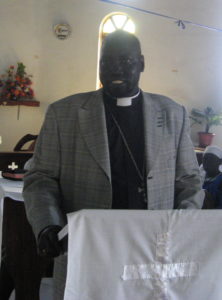 When I was a small boy in cattle camp, I had a dream that I would become a pastor among my people. In my dream I was wearing a white collar and standing before the church. I shared my dream with my cousins and they laughed at me. No one in our family had ever been a pastor.During the terrible times when I was running for my life, I didn’t think much about what I would do in the future. I just wanted to stay alive. I ran hundreds of miles to what we thought was a safe place in Ethiopia. Many died along the way. However, when I finally reached the crowded refugee camp, first in Ethiopia and then in Kenya, I had time again to consider my place in God’s plan. I learned to read so I could study the Bible, and I became a leader among the Sudanese people in the camp.I was chosen along with other “lost boys” to come to America in 2001, but I never forgot my dream. Seven years later, I returned to Sudan and part of my childhood dream became true – I received the white collar I had seen in my childhood dream. I was ordained in the Episcopal Church in Sudan, first as a deacon and then as a pastor.When I returned to Sudan, I was overwhelmed with the needs I saw there. Because of the danger caused by civil conflicts in South Sudan, I thought my original vision of returning to my homeland was not going to be possible soon. So, in June 2017 I travelled to northern Uganda where so many Sudanese people are staying in refugee camps. This seemed to be a good place to start a ministry, especially to children. However, there were so many obstacles – government requirements, proper licensing, and high costs – that I was discouraged. So, I asked God to show me where to begin.One of my heroes in the Old Testament is Nehemiah, because his story is so much like mine. His people had been taken from their homes in Israel and were living in foreign lands, just like the Sudanese people today. They wept because of what had become of the place they loved, as we weep today when we learn what is happening at home. The beautiful city of Jerusalem he had known as a boy was in ruins, its people scattered. My own city of Bor is not the pleasant place of my childhood, and has been scarred by years of fighting. Now people are returning to see what remains of their home land.Nehemiah is not only my hero. He is my model. I am planning to take the same steps he took to serve his people as they returned home. Thanks to a sister organization, Heart of Africa, I will be making a survey trip back to my home area in South Sudan in January 2018. I will be visiting the city of Bor to see how best to help my people. I do not know at this time what all the needs are or if the area is secure enough for me to return on a permanent basis. However, like Nehemiah, I plan to meet with leaders of the government and churches to see how Africa Sunrise Communities can help.If you believe in this vision, you can help, too. We need to build a team of partners who will stand with us in this venture. Our current need is for personal support. If we carry out this mission, it must be a team effort. I have been working as a home health care worker to provide for my family. However, this is getting me no closer to my vision. I need to take a bold step to fulfill the vision to which God has called me and for which I have been training.Here are two ways you can help:
When I was a small boy in cattle camp, I had a dream that I would become a pastor among my people. In my dream I was wearing a white collar and standing before the church. I shared my dream with my cousins and they laughed at me. No one in our family had ever been a pastor.During the terrible times when I was running for my life, I didn’t think much about what I would do in the future. I just wanted to stay alive. I ran hundreds of miles to what we thought was a safe place in Ethiopia. Many died along the way. However, when I finally reached the crowded refugee camp, first in Ethiopia and then in Kenya, I had time again to consider my place in God’s plan. I learned to read so I could study the Bible, and I became a leader among the Sudanese people in the camp.I was chosen along with other “lost boys” to come to America in 2001, but I never forgot my dream. Seven years later, I returned to Sudan and part of my childhood dream became true – I received the white collar I had seen in my childhood dream. I was ordained in the Episcopal Church in Sudan, first as a deacon and then as a pastor.When I returned to Sudan, I was overwhelmed with the needs I saw there. Because of the danger caused by civil conflicts in South Sudan, I thought my original vision of returning to my homeland was not going to be possible soon. So, in June 2017 I travelled to northern Uganda where so many Sudanese people are staying in refugee camps. This seemed to be a good place to start a ministry, especially to children. However, there were so many obstacles – government requirements, proper licensing, and high costs – that I was discouraged. So, I asked God to show me where to begin.One of my heroes in the Old Testament is Nehemiah, because his story is so much like mine. His people had been taken from their homes in Israel and were living in foreign lands, just like the Sudanese people today. They wept because of what had become of the place they loved, as we weep today when we learn what is happening at home. The beautiful city of Jerusalem he had known as a boy was in ruins, its people scattered. My own city of Bor is not the pleasant place of my childhood, and has been scarred by years of fighting. Now people are returning to see what remains of their home land.Nehemiah is not only my hero. He is my model. I am planning to take the same steps he took to serve his people as they returned home. Thanks to a sister organization, Heart of Africa, I will be making a survey trip back to my home area in South Sudan in January 2018. I will be visiting the city of Bor to see how best to help my people. I do not know at this time what all the needs are or if the area is secure enough for me to return on a permanent basis. However, like Nehemiah, I plan to meet with leaders of the government and churches to see how Africa Sunrise Communities can help.If you believe in this vision, you can help, too. We need to build a team of partners who will stand with us in this venture. Our current need is for personal support. If we carry out this mission, it must be a team effort. I have been working as a home health care worker to provide for my family. However, this is getting me no closer to my vision. I need to take a bold step to fulfill the vision to which God has called me and for which I have been training.Here are two ways you can help:
We are at the doorway to our ministry in South Sudan, and I am filled with gratitude for your willingness to listen to my story and to be our partners. Now I ask you to consider what your part in this endeavor might be. Your friend and fellow worker,Jacob Thon GuotExecutive Director, Africa Sunrise CommunitiesP.S. In Proverbs 19:18, God’s Word says, “Where there is no vision, the people perish.” I know that my people are perishing, and I know that I have a vision to help them see the Good News and God’s solutions to their problems.
On September 19, 2017, Jacob was interviewed on Lexington Community Radio for the Bluegrass Refugee Radio Show. Jacob spoke about his childhood tragedies, his life as a refugee in America, and his identity as a Former Lost Boy. You can listen to the full show below:
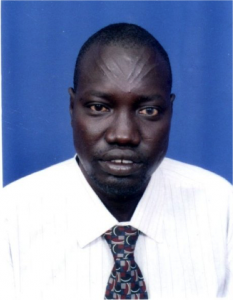 Personal Testimony, MY Experience As I walked across the campus during my time at Asbury Theological Seminary, several students kept asking me, “What happened to your head?” They were looking at my scarification. Some of my friends saw my scar as funny or they said, “I am so sorry for your accident on your head.” I said, “Dude, this is not an accident, it is my cultural norm.”The Problem– devaluing a person through devaluing their culture is dehumanizingThey asked me again: “Would you please tell us what happened and why?” I would tell them that it is my pleasure to talk about this; that it blessed me to discuss it. I would say that far from being an accident, this is a cultural norm among the Dinka tribes of South Sudan.The Need – Understanding through Conversation: Meeting people within their own cultureJesus meets people within their own culture, He does not devalue people because of their culture, rather He illuminates their value through their culture. We all must be aware of cultural differences when we speak to others. It’s all to easy to force our cultural norms on others, and to question them for being different than our idea of normal. Why Did I Write a Book?
Personal Testimony, MY Experience As I walked across the campus during my time at Asbury Theological Seminary, several students kept asking me, “What happened to your head?” They were looking at my scarification. Some of my friends saw my scar as funny or they said, “I am so sorry for your accident on your head.” I said, “Dude, this is not an accident, it is my cultural norm.”The Problem– devaluing a person through devaluing their culture is dehumanizingThey asked me again: “Would you please tell us what happened and why?” I would tell them that it is my pleasure to talk about this; that it blessed me to discuss it. I would say that far from being an accident, this is a cultural norm among the Dinka tribes of South Sudan.The Need – Understanding through Conversation: Meeting people within their own cultureJesus meets people within their own culture, He does not devalue people because of their culture, rather He illuminates their value through their culture. We all must be aware of cultural differences when we speak to others. It’s all to easy to force our cultural norms on others, and to question them for being different than our idea of normal. Why Did I Write a Book?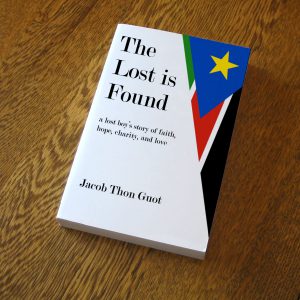 My classmates’ confusion about scarification and my culture caused me much anguish. My book is the solution. The Lost is Found: A “Lost Boy’s” Story of Faith, Hope, Charity, and Love tells my story of becoming a “Lost Boy,” when Muslim militias raided my village in what was then Sudan in 1987, when I was 7 years old. It details my years of running for my life, living in refugee camps, before being brought to the US in 2001. It describes a great deal about my life in Sudan and answers the questions about this lesser known culture. It tells a great deal about Dinka society, including marriage customs, the scarification rite of passage, and describes the rituals in detail. Great news! Jacob’s book, The Lost is Found, is now available in print and eBook format. All proceeds from his book go towards funding his mission to his own people, South Sudanese refugees, especially orphan children, in Uganda.EBooks are available from Amazon, as are print copies. However, if you make a gift of $50 to Africa Sunrise Communities, you will receive an autographed copy. Special thanks to www.EABooksPublishing.com. Thank you much for your generous support.Jacob Thon GuotExecutive Director and FounderAfrica Sunrise Communities
My classmates’ confusion about scarification and my culture caused me much anguish. My book is the solution. The Lost is Found: A “Lost Boy’s” Story of Faith, Hope, Charity, and Love tells my story of becoming a “Lost Boy,” when Muslim militias raided my village in what was then Sudan in 1987, when I was 7 years old. It details my years of running for my life, living in refugee camps, before being brought to the US in 2001. It describes a great deal about my life in Sudan and answers the questions about this lesser known culture. It tells a great deal about Dinka society, including marriage customs, the scarification rite of passage, and describes the rituals in detail. Great news! Jacob’s book, The Lost is Found, is now available in print and eBook format. All proceeds from his book go towards funding his mission to his own people, South Sudanese refugees, especially orphan children, in Uganda.EBooks are available from Amazon, as are print copies. However, if you make a gift of $50 to Africa Sunrise Communities, you will receive an autographed copy. Special thanks to www.EABooksPublishing.com. Thank you much for your generous support.Jacob Thon GuotExecutive Director and FounderAfrica Sunrise Communities
 My trip to Uganda is now underway. I am going to Bweyale Refugee Camp to make a general assessment of the situation there. I will meet with leaders of the refugees to talk about their needs and to assess the children’s educational needs from pre-school to 12th grade. I need to know which agencies are working in education in the camp, what they are doing, and how I can partner with them. I will meet with three groups of leaders: Sudanese refugees (Dinka, Nuer, and others); local Ugandan civil authorities in the camp; and officials from the United Nations High Commission on Refugees (UNHCR).I am going to Kampala to register as a local organization in Uganda. I will register as Living Hope Africa, which will function as the local arm of Africa Sunrise Communities. Fundraising in the U.S. will continue to flow through Africa Sunrise Communities. A local organization gives me freedom to do work in Uganda as a US-based one will not allow me to work there.In Nairobi I will be visiting the family of refugees whom I am supporting.I will go to Juba, South Sudan, to learn about four orphaned Dinka children from my village of Bor. Their parents were killed during a conflict in Bor; they were abducted by the Murle tribe but handed back to the UNHCR during negotiations. The UN contacted me to see if I could support these children, who are in a UN refugee camp in Juba: one 5-year old, two 6-year-olds, and one 7-year-old.I will be helped by Lual, who is my cousin. He lives in Juba and knows how help me negotiate the various officials and departments I must meet with.Please pray for me during this trip, that I might be able to meet with the right people and make the right contacts, and that the next steps for Africa Sunrise Communities/Living Hope Africa will become clear.My trip to Uganda will cost approximately $7,500. This will take care of airfare, food, lodging, and ground transportation, visas, organization registration fees, etc. If you can help me meet these financial obligations, please send a check to Africa Sunrise Communities, PO Box 82, Wilmore, KY 40390 or visit our website at www.africasunrise.org/get-involved/ to give towards my trip. All gifts are tax deductible. Thank you for your prayers and your financial support.Jacob GuotExecutive Director and Founder
My trip to Uganda is now underway. I am going to Bweyale Refugee Camp to make a general assessment of the situation there. I will meet with leaders of the refugees to talk about their needs and to assess the children’s educational needs from pre-school to 12th grade. I need to know which agencies are working in education in the camp, what they are doing, and how I can partner with them. I will meet with three groups of leaders: Sudanese refugees (Dinka, Nuer, and others); local Ugandan civil authorities in the camp; and officials from the United Nations High Commission on Refugees (UNHCR).I am going to Kampala to register as a local organization in Uganda. I will register as Living Hope Africa, which will function as the local arm of Africa Sunrise Communities. Fundraising in the U.S. will continue to flow through Africa Sunrise Communities. A local organization gives me freedom to do work in Uganda as a US-based one will not allow me to work there.In Nairobi I will be visiting the family of refugees whom I am supporting.I will go to Juba, South Sudan, to learn about four orphaned Dinka children from my village of Bor. Their parents were killed during a conflict in Bor; they were abducted by the Murle tribe but handed back to the UNHCR during negotiations. The UN contacted me to see if I could support these children, who are in a UN refugee camp in Juba: one 5-year old, two 6-year-olds, and one 7-year-old.I will be helped by Lual, who is my cousin. He lives in Juba and knows how help me negotiate the various officials and departments I must meet with.Please pray for me during this trip, that I might be able to meet with the right people and make the right contacts, and that the next steps for Africa Sunrise Communities/Living Hope Africa will become clear.My trip to Uganda will cost approximately $7,500. This will take care of airfare, food, lodging, and ground transportation, visas, organization registration fees, etc. If you can help me meet these financial obligations, please send a check to Africa Sunrise Communities, PO Box 82, Wilmore, KY 40390 or visit our website at www.africasunrise.org/get-involved/ to give towards my trip. All gifts are tax deductible. Thank you for your prayers and your financial support.Jacob GuotExecutive Director and Founder
Fighting continues in South Sudan, which over the past 3 years has seen more than 1 million of its people fleeing the country, according to the United Nations refugee agency. Over 185,000 have fled since July alone. This does not include the 1.6 million of its citizens who are displaced within the country, having fled their homes due to the violence. These figures mean that 20% of South Sudan’s population, or 1 in 5 of its citizens, are counted as refugees. Many of these refugees have fled the South Sudanese capital city of Juba, which is in the south of the country. Over one-third of these went south to Uganda, but other neighboring African countries have also taken in hundreds of thousands of these refugees.The fighting began in December of 2013, when President Salva Kiir and former Vice President Machar, the most powerful members of their respective Dinka and Nuer ethnic groups, struggled for control of their country. Machar was eventually forced out and replaced by another Vice President, but Machar does not recognize this change in leadership, and so the bloodshed continues, between and even within ethnic groups. A cease-fire instituted in August 2015 was soon broken.A Worsening SituationOne of the leaders in the refugee camps has written to Jacob to report that the camps at Kirangdongo and Yumba have been closed. Food shortages are severe; lack of leadership is hindering food rations from getting to those who need them most.
Many of these refugees have fled the South Sudanese capital city of Juba, which is in the south of the country. Over one-third of these went south to Uganda, but other neighboring African countries have also taken in hundreds of thousands of these refugees.The fighting began in December of 2013, when President Salva Kiir and former Vice President Machar, the most powerful members of their respective Dinka and Nuer ethnic groups, struggled for control of their country. Machar was eventually forced out and replaced by another Vice President, but Machar does not recognize this change in leadership, and so the bloodshed continues, between and even within ethnic groups. A cease-fire instituted in August 2015 was soon broken.A Worsening SituationOne of the leaders in the refugee camps has written to Jacob to report that the camps at Kirangdongo and Yumba have been closed. Food shortages are severe; lack of leadership is hindering food rations from getting to those who need them most.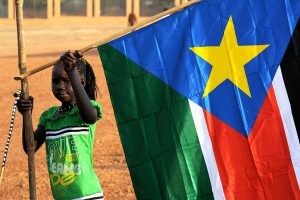 Many of those fleeing the violence are children who are alone. Their parents have been either killed or wounded and left behind as the children ran for their lives, or the families became separated in the confusion. This was the same situation in which Jacob Guot, founder of Africa Sunrise Communities, found himself when he became one of the “Lost Boys” of South Sudan, in earlier fighting. At the age of 7, he was forced to flee his village for his life and wander for thousands of miles over several years, before ending up in a Ugandan refugee camp. It was from there that he was brought to the United States, where he has since become an American citizen and obtained an education.Jacob is now working to raise funds for his organization to help with the plight of his fellow South Sudanese refugees in a particular refugee camp in Uganda. He is himself helping to support several children with funds to pay for education and school fees. His larger goal for Africa Sunrise Communities is for him to return to the Ugandan refugee camp and set up schools there for the children.
Many of those fleeing the violence are children who are alone. Their parents have been either killed or wounded and left behind as the children ran for their lives, or the families became separated in the confusion. This was the same situation in which Jacob Guot, founder of Africa Sunrise Communities, found himself when he became one of the “Lost Boys” of South Sudan, in earlier fighting. At the age of 7, he was forced to flee his village for his life and wander for thousands of miles over several years, before ending up in a Ugandan refugee camp. It was from there that he was brought to the United States, where he has since become an American citizen and obtained an education.Jacob is now working to raise funds for his organization to help with the plight of his fellow South Sudanese refugees in a particular refugee camp in Uganda. He is himself helping to support several children with funds to pay for education and school fees. His larger goal for Africa Sunrise Communities is for him to return to the Ugandan refugee camp and set up schools there for the children.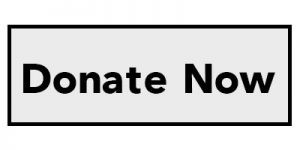 Please join in helping him to fulfill this goal. Your gifts are tax-deductible, as Africa Sunrise Communities is a recognized 501(c)(3) organization. Please visit the “Get Involved” section of this website to give.Blessings,President and Founder,Jacob Guot
Please join in helping him to fulfill this goal. Your gifts are tax-deductible, as Africa Sunrise Communities is a recognized 501(c)(3) organization. Please visit the “Get Involved” section of this website to give.Blessings,President and Founder,Jacob Guot
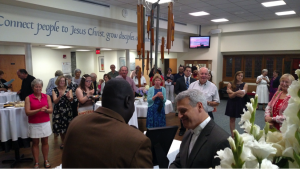 On the weekend of July 23-24, 2016, Jacob Guot visited the First United Methodist Church in Lancaster, Pennsylvania. He was accompanied by his whole family – his wife, Rebecca, his son Biar (7), his daughter Angieth (6), and his son Ayiei (nearly 3). Pastor Joe DiPaolo and the congregation of the church welcomed the Guot family warmly and gave them the opportunity to tell their story.Jacob was privileged to preach in the three Sunday morning services and the church held a reception for the family after the services. Jacob also visited some individual members of the congregation and was invited to meet with the Missions Committee of the church.A reception was held for the Guot family after the services and Jacob presented a recognition certificate to Pastor Joe DiPaolo for the church. Pictured is Rev. Jacob Guot with FUMC Pastor Joe DiPaolo with the congregation during the reception.Jacob told the story of his being forced to flee for his life as a 7-year-old boy. Through God’s hand of protection upon him, he grew up in a refugee camp and then was brought to the United States as one of South Sudan’s “lost boys” in 2001. He subsequently became an American citizen, learned English, and obtained an education. With his recent graduation from Asbury Theological Seminary in Wilmore, Kentucky, Jacob is now going to work to provide for his family.But his heart for South Sudan has led him to establish his non-profit organization, Africa Sunrise Communities, through which he is endeavoring to raise enough funds to take him and his family to Uganda to work inside a large South Sudanese refugee camp there. Jacob wants to give the children of the camp an education to give them hope for their own lives and to give his country of South Sudan a future.Will you help Jacob to bring hope and reconciliation to South Sudanese refugee children in Uganda? Please give generously to this effort. All gifts are tax-deductible. Yours truly,ASC Founder and President,Jacob Guot
On the weekend of July 23-24, 2016, Jacob Guot visited the First United Methodist Church in Lancaster, Pennsylvania. He was accompanied by his whole family – his wife, Rebecca, his son Biar (7), his daughter Angieth (6), and his son Ayiei (nearly 3). Pastor Joe DiPaolo and the congregation of the church welcomed the Guot family warmly and gave them the opportunity to tell their story.Jacob was privileged to preach in the three Sunday morning services and the church held a reception for the family after the services. Jacob also visited some individual members of the congregation and was invited to meet with the Missions Committee of the church.A reception was held for the Guot family after the services and Jacob presented a recognition certificate to Pastor Joe DiPaolo for the church. Pictured is Rev. Jacob Guot with FUMC Pastor Joe DiPaolo with the congregation during the reception.Jacob told the story of his being forced to flee for his life as a 7-year-old boy. Through God’s hand of protection upon him, he grew up in a refugee camp and then was brought to the United States as one of South Sudan’s “lost boys” in 2001. He subsequently became an American citizen, learned English, and obtained an education. With his recent graduation from Asbury Theological Seminary in Wilmore, Kentucky, Jacob is now going to work to provide for his family.But his heart for South Sudan has led him to establish his non-profit organization, Africa Sunrise Communities, through which he is endeavoring to raise enough funds to take him and his family to Uganda to work inside a large South Sudanese refugee camp there. Jacob wants to give the children of the camp an education to give them hope for their own lives and to give his country of South Sudan a future.Will you help Jacob to bring hope and reconciliation to South Sudanese refugee children in Uganda? Please give generously to this effort. All gifts are tax-deductible. Yours truly,ASC Founder and President,Jacob Guot
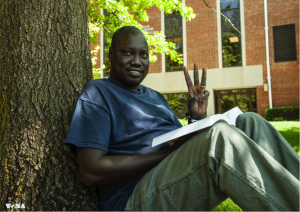 Jacob Guot will be speaking at First United Methodist Church in Lancaster, PA, the weekend of Sunday, July 24, 2016. He will be sharing his story and his vision for work among the refugees of South Sudan in the three Sunday morning services. He will also be meeting with the Missions Committee of the church over the weekend.If you are in the area, Jacob invites you to attend the church that morning and to hear him speak. Jacob has just graduated from Asbury Theological Seminary. He is now seeking to build up his non-profit organization, Africa Sunrise Communities, by accepting speaking engagements and encouraging others to join him in carrying out his vision. He is seeking financial partners who will help him to do so.If you would like to help Jacob in his work with South Sudanese refugees, as he begins the process of helping them to achieve literacy and to begin the work of restoration and reconciliation, please check out the “Get Involved” section of this website and give generously to his work. All gifts are tax-deductible.
Jacob Guot will be speaking at First United Methodist Church in Lancaster, PA, the weekend of Sunday, July 24, 2016. He will be sharing his story and his vision for work among the refugees of South Sudan in the three Sunday morning services. He will also be meeting with the Missions Committee of the church over the weekend.If you are in the area, Jacob invites you to attend the church that morning and to hear him speak. Jacob has just graduated from Asbury Theological Seminary. He is now seeking to build up his non-profit organization, Africa Sunrise Communities, by accepting speaking engagements and encouraging others to join him in carrying out his vision. He is seeking financial partners who will help him to do so.If you would like to help Jacob in his work with South Sudanese refugees, as he begins the process of helping them to achieve literacy and to begin the work of restoration and reconciliation, please check out the “Get Involved” section of this website and give generously to his work. All gifts are tax-deductible.
Urgent Prayer for God to Intervene in South Sudan SufferingDuring this last week, fighting has once again broken out between rival factions in the South Sudanese capital of Juba. According to the Sudan Tribune, conflict is ongoing between forces loyal to the President, Salva Kiir, and those loyal to the First Vice President, Riek Machar. Machar has been forced out of his base in Juba.A number of United Nations peacekeepers, as well as civilians, have been killed or wounded. Thousands of civilians have fled. The United Nations Security Council has condemned the fighting and has urged the respective leaders to work harder to contain their forces.The situation has deteriorated so that the President of Sudan, the country from which South Sudan split itself off and gained its independence, is evacuating its 50,000 nationals from the city of Juba.The United States has sent 47 American soldiers to protect its embassy in South Sudan. Non-essential staffers have been evacuated already.The relatively new country of South Sudan marked its fifth anniversary recently, but armed conflict has been a hallmark of the area for decades. For further information you may visit the website of the Sudan Tribune at www.sudantribune.com.Blessings,Jacob Thon GuotASC Founder and President
Nearly 100,000 South Sudanese fled from their homes into Uganda when political disputes within the ruling party in South Sudan led to the breakout of violence.Within the settlement camps in Uganda, South Sudanese refugees are using their agricultural skills to raise funds for their children’s school fees. Among these concerned parents is James Maker Ter. He works every day to clear weeds from his farm. During their holidays, his five children work alongside him to expand the land they are working. Although the United Nation refugee agency is supporting him, “I have to do more,” he says, “in order to support my family. I see this land has a lot of opportunities and I have decided to cultivate and I know doing this job will strengthen me.”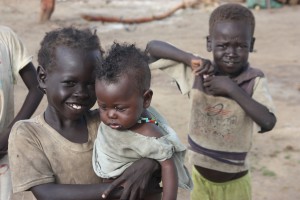 Last year he produced 50 bags of maize, each weighing around 25 pounds. He intends to produce more this year. Out of those 50 bags last year, he sold 20 of them to buy school uniforms for his children and to pay their medical bills.He is encouraging his fellow refugees in the displaced camps to take up their hoes and begin cultivation. Farming, he pointed out, does not require lots of capital. “When you produce more food, you will not have any problem. By engaging yourself into agriculture is likely to make you richer. If you sell clothes it may not work out in the hunger time, but if you have more grain stored and then your business can still boom,” said Maker.Another refugee, Mary Nyaber Koryom, who cares for 10 children in her house, says it has not been easy to provide for her children’s needs, like school uniforms and fees. “We have so many challenges to do this job. We lack tractors and buying pesticide become very expensive. We lack support to practice agriculture; we do this work for the sake of our own surviving in the camp,” she said.This is one of the two major thrusts of Africa Sunrise Communities – to help refugees in the Ugandan camps to take up gardening and agriculture, both for their own food source and for them to be able to afford schooling for their children. Your gift to our foundation can help to provide the means for these refugees to get started in providing for themselves and their families.(Information for this article was adapted from an article from the Sudan Tribune, March 6, 2016.)
Last year he produced 50 bags of maize, each weighing around 25 pounds. He intends to produce more this year. Out of those 50 bags last year, he sold 20 of them to buy school uniforms for his children and to pay their medical bills.He is encouraging his fellow refugees in the displaced camps to take up their hoes and begin cultivation. Farming, he pointed out, does not require lots of capital. “When you produce more food, you will not have any problem. By engaging yourself into agriculture is likely to make you richer. If you sell clothes it may not work out in the hunger time, but if you have more grain stored and then your business can still boom,” said Maker.Another refugee, Mary Nyaber Koryom, who cares for 10 children in her house, says it has not been easy to provide for her children’s needs, like school uniforms and fees. “We have so many challenges to do this job. We lack tractors and buying pesticide become very expensive. We lack support to practice agriculture; we do this work for the sake of our own surviving in the camp,” she said.This is one of the two major thrusts of Africa Sunrise Communities – to help refugees in the Ugandan camps to take up gardening and agriculture, both for their own food source and for them to be able to afford schooling for their children. Your gift to our foundation can help to provide the means for these refugees to get started in providing for themselves and their families.(Information for this article was adapted from an article from the Sudan Tribune, March 6, 2016.)
Two recent articles from the Sudan Tribune newspaper tell of worsening violence and the dire need for food among people in South Sudan.On February 17, 2016, one of the articles described the urgent need for food for 86,000 people in two counties of Jonglei state in South Sudan. Officials from the Relief and Rehabilitation Commission (RRC) reported that an assessment of conditions among returnees and among Internally Displaced Persons (IDPs) indicated that the people needed both food and non-food support. The RRC organizations were urged to act swiftly in light of the plight of these thousands of people.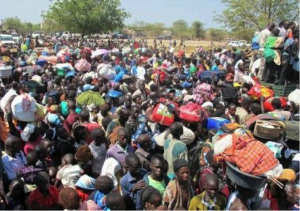 James Jok, the state acting RRC director, said that he organized a meeting of RRC humanitarian organizations to assign each agency specific roles to intervene in curbing hunger and in developing a comprehensive strategy for aid. He also urged the South Sudanese government to provide needed infrastructure, especially health facilities and schools.Agencies say that over two million people were displaced during the 21-month-old conflict, which broke out in the world’s youngest nation upon its establishment in mid-December 2013.The second article, dated February 16th, described renewed clashes in South Sudan’s Wau state between the army and the armed opposition faction. Hundreds of people have been forced to flee from their homes, residents and eyewitnesses have said.
James Jok, the state acting RRC director, said that he organized a meeting of RRC humanitarian organizations to assign each agency specific roles to intervene in curbing hunger and in developing a comprehensive strategy for aid. He also urged the South Sudanese government to provide needed infrastructure, especially health facilities and schools.Agencies say that over two million people were displaced during the 21-month-old conflict, which broke out in the world’s youngest nation upon its establishment in mid-December 2013.The second article, dated February 16th, described renewed clashes in South Sudan’s Wau state between the army and the armed opposition faction. Hundreds of people have been forced to flee from their homes, residents and eyewitnesses have said.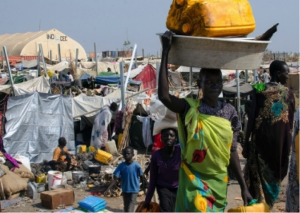 The incident took place in the western part of the state capital, Besilia, forcing hundreds of people, mainly women and children, to seek food and shelter elsewhere. According to multiple residents who arrived in Wau town on Sunday, people on both sides of the conflict participated in burning huts to the ground. The most affected areas were Abushaka, Kapi and Safa, initially suspected by government forces to be opposition-held territories.The armed confrontation between the two main warring parties came a day after a delegation of ceasefire monitors arrived in Wau town to access the security situation in the region. The armed opposition leader in Wau state denied that their forces were the first to attack government troops in the specified areas.We urge our Africa Sunrise Community supporters to pray for the needs of the refugees and displaced persons and for the hostilities in South Sudan to cease and the ceasefire to be observed. Also, Bweyale refugees in Uganda have expressed their fears concerning the scheduled elections now going on. They need prayer particularly for peace. Read the Sudan Tribune Articles Here:86,000 Urgently Need Food in Jonglei State
The incident took place in the western part of the state capital, Besilia, forcing hundreds of people, mainly women and children, to seek food and shelter elsewhere. According to multiple residents who arrived in Wau town on Sunday, people on both sides of the conflict participated in burning huts to the ground. The most affected areas were Abushaka, Kapi and Safa, initially suspected by government forces to be opposition-held territories.The armed confrontation between the two main warring parties came a day after a delegation of ceasefire monitors arrived in Wau town to access the security situation in the region. The armed opposition leader in Wau state denied that their forces were the first to attack government troops in the specified areas.We urge our Africa Sunrise Community supporters to pray for the needs of the refugees and displaced persons and for the hostilities in South Sudan to cease and the ceasefire to be observed. Also, Bweyale refugees in Uganda have expressed their fears concerning the scheduled elections now going on. They need prayer particularly for peace. Read the Sudan Tribune Articles Here:86,000 Urgently Need Food in Jonglei State
New IOM clinic provides critical care for displaced in Upper Nile